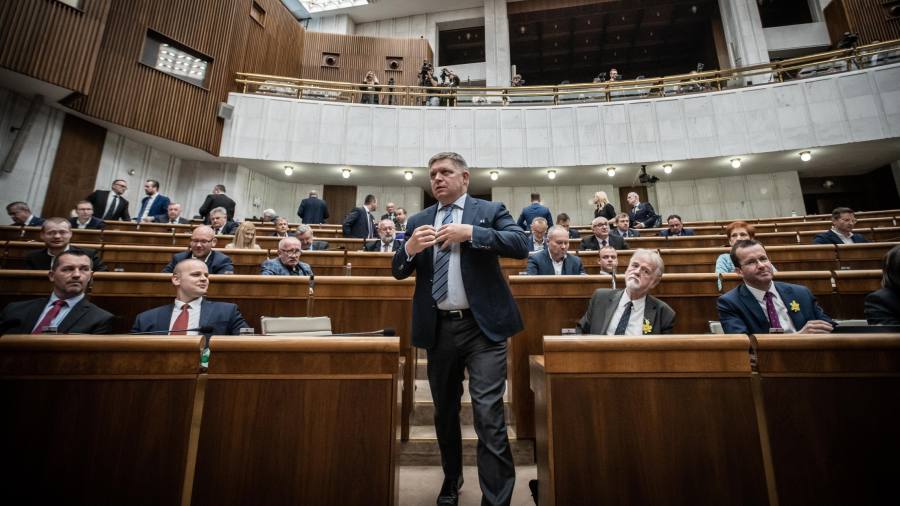
Receive free Slovakia updates
We’ll send you a myFT Daily Digest email rounding up the latest Slovakia news every morning.
The writer is a political economist focused on central and eastern Europe and a non-resident fellow at the Atlantic Council
A sense of foreboding is enveloping Slovakia as it prepares for an early general election on September 30. And in the wake of the resignation of prime minister Eduard Heger after a tumultuous term, the favourite to replace him is Robert Fico, who, if elected, would take the position for the fourth time.
Previously, it had looked as though Fico’s days were numbered. In 2018, he had resigned as prime minister in a bid to contain a political crisis sparked by the murder of an investigative journalist.
Nevertheless, Fico’s Smer party has defied the odds, overtaking its western-oriented offshoot, Hlas, and emerging as the frontrunner. Support for the social-liberal Progressive Slovakia party has surged, but its options for forming a coalition are limited.
Were Fico to win, his victory would reflect a wider trend: the remarkable staying power of central Europe’s populist governments. The ruling national-conservative Law and Justice continues to dominate opinion polls in Poland ahead of the election there in October. In Hungary, Viktor Orbán won a fourth successive term as prime minister in 2022.
It should be noted, however, that recent elections in Czechia and Slovenia saw a shift towards pro-western leadership.
While it might be tempting to attribute Fico’s revival solely to popular discontent at the Heger administration’s infighting and handling of various important policy issues, the skill with which he has harnessed growing anti-establishment sentiment in his voter base should not be underestimated.
In 2021, he won support by questioning anti-pandemic measures, playing to the preoccupations of the increasingly vocal anti-vaccination movement in Slovakia. More recently, Fico has used Russia’s invasion of Ukraine to stoke anti-western sentiment.
The more softly-spoken Hlas party chair Peter Pellegrini, who consistently polls as among Slovakia’s most trustworthy politicians, could fill the prime minister’s seat in Fico’s coalition, adding a veneer of respectability. Smaller fringe parties, such as the far-right Republika could join as silent partners.
And for all the pro-Russian rhetoric, domestic policy is sure to trump foreign policy when voters go to the polls at the end of the month.
Smer’s programme promotes a strong social-democratic state underpinned by traditional values. It promises financial bonuses for workers, pensioners and families. And it pledges to combat inflation and preserve living standards while disdaining liberal economic policies and multinational companies — despite these having played a pivotal role in boosting economic growth and employment during Fico’s previous terms.
The European Commission projects that Slovakia will have the largest fiscal deficit in the EU in 2023-24. Yet despite this, Smer and its allies remain apparently unperturbed by the challenge of funding expansive state policies, and the implications for the cost of government borrowing.
Fico’s comeback will do nothing to stop Slovakia haemorrhaging talent, amid the prospect of continued corruption and diminished economic opportunities. Two-thirds of Slovaks aged between 18 and 25 already study abroad or want to, with the exodus set to accelerate just as the country needs to move towards a more innovation-driven economy.
Slovakia cannot afford to miss another opportunity to complete its democratic transition and revive its stagnant economy.